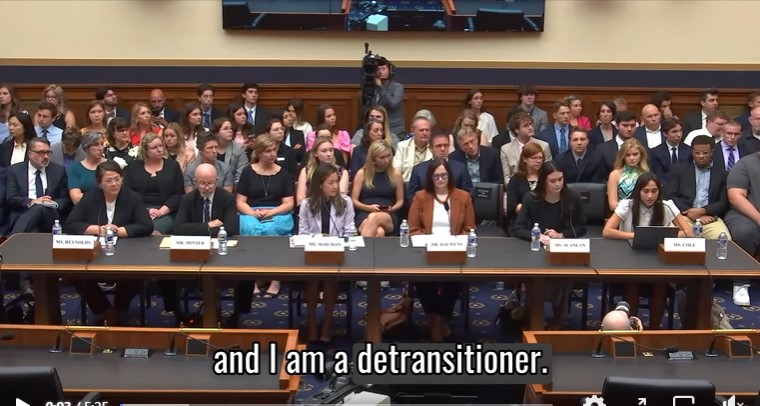Advocates for and against gender-affirming care for minors testified at the House Judiciary subcommittee on “Anti-Trans Hearing Against Gender Affirming Care” on Thursday. The purpose of the hearing was to review the “dangers and due process violations” of child gender transitions and “will examine and expose how children are being coerced by adults in positions of authority into life-altering and medically questionable gender transition procedures without full understanding of the meaning or impact.”
At the hearing, Chloe Cole, a 19-year-old detransitioner, broke down giving heartfelt testimony about her experiences with medical transition, including coercion by doctors, undergoing genital mutilation, such as a double mastectomy as a young teenager, and the permanent changes drugs have made to her body. “My childhood was ruined”, she cried.
“Today, I should be at home with my family, celebrating my 19th birthday, and instead I’m making a desperate plea to my representatives to learn the lessons from other medical scandals like the opioid crisis, to recognize that doctors are human too. And sometimes they are wrong.”
“Puberty is a rite of passage to adulthood, not a disease to be mitigated”, she added.

The controversy surrounding transitioning for “children” is heated and heavily political. Conservative politicians, pundits, and social media influencers accuse providers of pushing “gender ideology” and even “child abuse,” and they lobby for laws banning medical transition for minors. “A phalloplasty doesn’t turn a girl into a boy. And vaginoplasty doesn’t make a boy a girl.”
Progressives argue that denying access to care is a transphobic violation of human rights.
Medical and psychosocial care designed to affirm individuals’ gender identities has been demonstrated to mitigate many of the negative effects of gender dysphoria, or the distress that frequently accompanies a discrepancy between one’s assigned gender at birth and one’s perceived gender identity, but many conservatives don’t believe in the concept of gender dysphoria and see it as a passing fancy of adolescence, an imagined unease with one’s body that if left alone, will magically disappear with maturity.
The argument made by conservatives is that “children” don’t know their own mind and therefore should not do permanent damage to their bodies.
Chloe Cole experienced a form of “buyer’s remorse” after she transitioned and has subsequently become an advocate against it. “What message do I want to bring to American teenagers and their families? I didn’t need to be lied to. I needed compassion. I needed to be loved. I need to be getting therapy to help me work through my issues. Not affirmed to my delusion that by transforming into a boy, it would solve all my problems,” Cole said in her opening statement before the House Judiciary subcommittee.
Democrats on the committee attempted to disparage the premise for the hearing by arguing that the entire American medical establishment deems it to be “safe and effective” and “life-saving mainstream medical treatment for children.”
But Cole, asked to comment on the inherent worth of everyone going through sexual confusion as a child and whether she believed the American healthcare system had failed her, firmly replied, “On every single level: By doctors and systemically”.

Detransitioning means stopping or reversing gender transition, which can include medical treatment or changes in appearance, or both.
How common is it for trans people to regret their move and detransition as Chloe Cole has done?
The answer is not clear-cut. Some studies suggest that rates of regret have declined over the years as patient selection and treatment methods have improved. In a review of 27 studies involving almost 8,000 teens and adults who had transgender surgeries, mostly in Europe, the U.S and Canada, 1% on average expressed regret. For some, regret was temporary, but a small number went on to have detransitioning or reversal surgeries, the 2021 review said.
Research and reports from individual doctors and clinics suggest that detransitioning is rare. The few studies that exist have too many limitations or weaknesses to draw firm conclusions, said Dr. Michael Irwig, director of transgender medicine at Beth Israel Deaconess Medical Center in Boston.
He said it’s difficult to quantify because patients who detransition often see new doctors, not the physicians who prescribed the hormones or performed the surgeries. Some patients may simply stop taking hormones.

“My own personal experience is that it is quite uncommon,” Irwig said. “I’ve taken care of over 350 gender-diverse patients and probably fewer than five have told me that they decided to detransition or changed their minds.”
One thing is clear: that comprehensive psychological counseling before starting treatment is essential. That, along with family support, can reduce chances for regret and detransitioning.
Chloe Cole believes she speaks for many, that there are thousands like her, and that enough children have already been victimized by this barbaric pseudoscience. “Please let me be your final warning,” she says.












